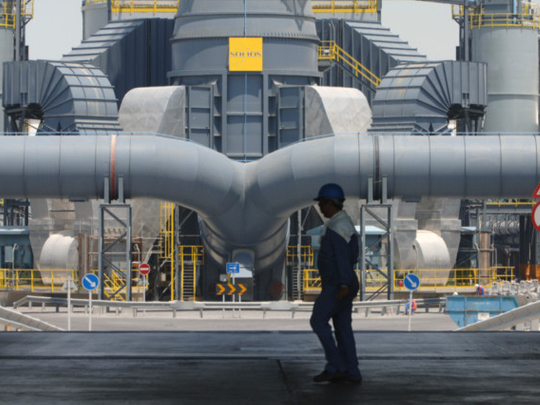
Dubai: Aluminium Bahrain (Alba), which is 70 per cent owned by the state, expects to pay similar yields to the government for a record borrowing plan after the nation’s credit risk fell to the lowest in almost a year.
The metals maker known as Alba plans to raise $2.5 billion (Dh9.1 billion) from bonds, Islamic finance and export credit, Chief Executive Officer Laurent Schmitt said on July 30. The cost to insure Bahrain’s debt against non-payment for five years fell almost twice as much as the regional average this quarter, according to data provider CMA. The island kingdom sold $1.5 billion of 10- year bonds at 6.125 per cent in June.
Alba is returning to the debt market after a decade to fund a plan to boost production even as US and European competitors shut plants. The company, which benefits from subsidized regional energy costs, is betting aluminium prices will rebound from the past year’s 22 per cent slump. Bahrain’s economic growth will quicken to 3 per cent this year from 1.8 per cent in 2011, forecasts compiled by Bloomberg show.
“Given the government’s majority ownership, which gives lenders additional comfort with regard to the credit risk, Alba should be able to achieve an attractive cost of funding,” said Chavan Bhogaita, head of the markets strategy group at National Bank of Abu Dhabi PJSC. “There is likely to be decent appetite based on the demand we witnessed for the government’s latest issue.”
Bahrain, rated at Standard & Poor’s second-lowest investment grade of BBB, received more than $6 billion in bids for the bonds it sold in June, suggesting investors are confident in the stability of the nation that was most-affected in the six-member Gulf Cooperation Council by popular unrest in Arab countries last year.
Regional investors bought 43 per cent of the bonds, while 32 per cent were from Europe, 14 per cent from the U.S. and 11 per cent from Asia, the government said in a statement in June.
Bahrain’s five-year credit default swaps fell 70 basis points this quarter to 275 yesterday, the lowest since Aug. 10, 2011, according to CMA, which is owned by McGraw-Hill Cos. and compiles prices quoted by dealers in the privately negotiated market. That outpaced the average 36 basis-point decline to 181 of the four GCC countries for which the contracts are traded.
‘Fairly Favourable’
“The pricing is likely to be similar to Bahraini debt, since we are 70 per cent government-owned,” Alba’s Chief Finance and Supply Officer Tim Murray said on a July 30 conference call from Bahrain’s capital Manama. “All in all, 6 per cent is fairly favourable.”
Alba said on July 23 it hired Paris-based BNP Paribas SA to advise on financing. It plans to use the funds to add a sixth potline to its smelter to produce 400,000 metric tonnes a year, boosting total capacity to 1.3 million tonnes by 2015.
CEO Schmitt predicted on the conference call that aluminium prices will rise to above $2,200 a ton this year as producers cut output and as demand in the Middle East, North America and Japan rises. The price was $1,879 yesterday and climbed to $1,884.50 at 9:05am in London. Higher prices may help boost Alba’s earnings after its second-quarter profit dropped 49 per cent as sales fell 19 per cent.
Output Cuts
GCC metal companies are relying on cheap energy to buck a global trend of shrinking output. Emirates Aluminium Co. in the United Arab Emirates plans to expand capacity to 1.3 million tonnes a year by 2014, while Saudi Arabian Mining Co.’s $10.8 billion venture with Alcoa Inc. includes building a 740,000 ton- a-year smelter by 2013.
“The sort of thing that may raise eyebrows are a negative price outlook for aluminium and the other plant expansions going on in the Middle East,” Jarmo Kotilaine, chief economist at Jeddah-based National Commercial Bank, said by phone on July 31. “But many people feel that the aluminium price correction has been excessive, while regional capacity expansions are premised on forecast growth in demand.”
Alba has fared better than global competitors, with production in the first half of 2012 rising 1.7 per cent and exceeding its own forecast. Rio Tinto Group, the world’s second- largest producer, said last month it reduced output by 15 per cent at a New Zealand plant and Norway’s Norsk Hydro ASA said in June that it would shut 120,000 tonnes of capacity in Australia.
Building Capacity
Unresolved political tension in the nation of 1.2 million has affected borrowing costs. The yield on Bahrain’s dollar- denominated debt due 2022 was 6.05 per cent today, according to data compiled by Bloomberg. The yield on Russia’s similarly rated 4.5 per cent bonds also maturing in 2022 was 3.15 per cent and that on the 5.591 per cent 2021 bonds of Dubai, which avoided default in 2009, was 4.86 per cent.
Tensions have simmered since the government cracked down on mass protests last year with the help of troops from allies including Saudi Arabia. The mostly Shiite demonstrators are demanding more civil rights from the Sunni Muslim rulers.
Bahrain Mumtalakat Holding Co. BSC, which owns the government’s stake in Alba, last week set up a 3 billion-ringgit ($968 million) Islamic bond program. The yield on Mumtalakat’s 5 per cent notes maturing June 2015 dropped 140 basis points this year to 4.34 per cent today, data compiled by Bloomberg show.
“There is clearly the view that Bahraini risk is not that different from the rest of the region because there is a regional commitment to support the regime,” said National Commercial’s Kotilaine. “The sovereign issue showed demand is there, although it shows that demand is conditional on the extra premium being there.”












